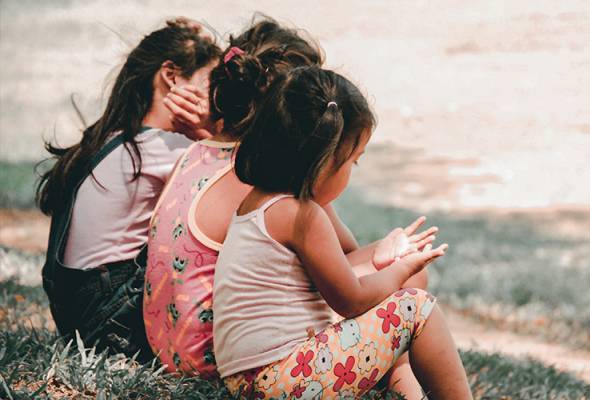
Published by AstroAWani, image by AstroAwani.
The United Nations Children’s Fund (UNICEF) defines an orphan as a child under the age of 18 who has lost one or both parents to any cause of death. For reference, children under institutionalised care are placed in residential settings like orphanages, where there are little caregivers and many residents. On the other hand, non-institutionalised care refers to children who grow up in a normal family-based setting, such as through adoption or kinship care.
In Malaysia, a child is placed in orphanages or institutional care under two circumstances:
- Children who are true orphans—those whose parents have both died;
- Children who are unable to live with or must be separated from their parents or guardians owing to circumstances such as parental death, abandonment, neglect, abuse and for whom the government provides protection and aid.
Global data indicates there are around 153 million orphan children across the world. Asia holds the largest number of orphaned children, at 71 million (See “The Status of Orphans in Developing Countries”, The Borgen Project, August 1, 2014).
The latest data collected by OrphanCare Foundation Malaysia, a non-profit NGO established in 2008 under the patronage of Her Royal Highness Sultanah Pahang, Sultanah Hajjah Kalsom estimates that there were around 64,000 children living under institutional care in Malaysia by 2021 (See “The Problem of Institutionalisation: Everyday is one too many”, OrphanCare, September 29, 2021). However, as per maintained by the Department of Social Welfare (JKMM) only 1,510 institutional children are registered under the 15 government-owned institutional care centres across Malaysia (JKMM, March 2, 2021).
The welfare of institutionalised children in Malaysia are accorded protection under the Care Centre Act 1984, the Child Act 2001, the Registration of Adoptions Act 1952, and the Care Centre Act 1993.
By mandating these laws or regulations to be applied in all institutional care or foster care, it will serve to give the children an adequate and protective environment, particularly from cases of abuse, abandonment, violence and exploitation.
However, concerns with orphan children in Malaysia extend beyond matters of neglect and perceived abuse:
- The physical health of institutionalised children.
The physical health of an institutionalised child is affected by the environment, their access to healthcare services, food intake etc. and these put the child at a high-risk vulnerability to diseases when are neglected.
Although better than being abandoned, according to a study conducted by Shuhada et. Al (2019), an institutionalised child has a higher risk of poor health, physical underdevelopment, delayed brain growth, and emotional attachment issues compared to a normal child (See “Developing the Comprehensive Social Well-Being Index for Orphans in Malaysian Orphanages,” European Proceedings, 2019).
A study on 15,331 children in Malaysia found that one-fifth (25%) of the children suffered from at least one form of malnutrition such as over- and undernutrition, contributing to overweight or underweight body mass index, inadequacies in micronutrients, protein intake and among others (See “Prevalence of undernutrition and associated factors in young children in Malaysia: A nationwide survey”, Lee, et al., Frontiers in Pediatrics, 2022).
Due to limited access to food and medical treatment, children who live in institutional care may be more at risk of malnutrition and other health-related diseases such as diarrhoea and eye diseases.
- Insufficient of social relationship with the community
Social interactions, connections and activities have an impact on how well a child’s psycho-social development is progressing. The inadequacies of social relationships contribute to high-risk factors for mental health conditions such as depression and anxiety.
Research indicates, that substantial mental health issues affect over 80% of children and adolescents in orphanages or foster care facilities, compared to 20% of adolescents in the general population in Malaysia.
To elucidate, an extremely high frequency of depression (85.2%), anxiety (79.4%), stress (86.1%) and low self-esteem were prevalent in the research conducted among specific institutional care in Malaysia (See “Improving emotional health and self-esteem of Malaysian adolescents living in orphanages through Life Skills Education program: A multi-centre randomized control trial”, Mohammadzadeh M, et al., PLoS one, Vol. 15, Issue 12, 2019).
To further elaborate, a survey conducted by the Ministry of Women, Family and Community Development (MWFCD) in 2015 indicates, almost all of the children and adolescents in Malaysian orphanages had low self-esteem and self-confidence (See “Developing the Comprehensive Social Well-Being Index for Orphans in Malaysian Orphanages,” European Proceedings, 2019).
The absence of interpersonal relationships has a detrimental impact on the structure and development of the brain, putting these children at a greater risk of health problems in adulthood.
- Access to quality education
As ratified by Malaysia, the Convention on the Rights of the Child, Article 29 highlights the rights of a child to obtain access to education, among others. A report by UNESCO indicates that 8% (58.4 million) of children globally, are not receiving formal primary education in schools due to various reasons—conflicts, poverty, child marriage, etc. (See “Access to basic education: Almost 60 million children of primary school age are not in school”, The Guardian, November 02, 2021).
An article by a local news publisher, Sinar Daily shares the stories of two girls in institutional care who could not have the access to government aid or education because they were unable to attain their Malaysian citizenship Identification Card (MyKad). Even more surprising, these individuals were raised in government-run institutional care (See “Orphaned and Unfortunate: The systemic rot and the ill-fated victims (Part 3), Sinar Daily, May 30, 2022).
In addition, a study by Jariah and Cherish (2015), found that children in institutional care in Malaysia receive insufficient pocket money for school which causes them to skip extra classes or be absent from school which impacts the academic performance of these children (See “Recognising Barriers to Academic Achievement of Foster Children in Malaysia: A Case Study”, Jariah and Cherish, Asia Pacific Journal of Contemporary Education and Communication Technology, Vol 1, Issue 1, 2015).
Quality education has the potential to increase the employability rate, improve the health and welfare of these institutionalised children and enables them to partake in state economic growth and development.
- Lack of resources, support and training received by caregivers.
High caregiver-child ratio, high staff turnover and treating children with different physical and emotional needs are some of the challenges faced by caregivers. In absence of parents or family, caregivers play an important role in the development and growth of children in orphanages.
Often, the lack of resources and support deteriorates the caregiver’s mental health and eventually leads to the maltreatment of children in institutional care. According to the World Health Organization (WHO), child maltreatment occurs to a child below the age of 18, who is exposed to any form of abuse such as physical, mental, sexual, emotional, negligence, commercialising children and other forms of exploitation which harms the growth and development of a child.
Taking into account, overcrowded institutional/foster care centres and the low number of professional caregivers, (See “The critical need of enhancing the quality of services in child care centres, EMIR Research, February 9, 2023), has a high possibility of child maltreatment happening in institutional care. However, the possibility of MWFCD providing trainings for caregivers for institutional care management and training for professional social services employees will be an efficient methodology to detect maltreatment in institutional care.
Following are the proposed policy recommendations by EMIR Research:
- Earmarking a central and systematic department under MWFCD to monitor institutional care in Malaysia.
The absence of reliable statistics and information on the number of institutional care and its’ residents, the list of available aids and provisions provided by the government for institutional care, the nationality of orphans, etc. shows that institutionalised children and adolescents in Malaysia are underserved, under-supported and marginalised in the community.
The ministry should make it a priority to ensure that all operating institutional care in Malaysia are registered under the JKMM and ensure stateless orphans are registered and given national registration identification cards (MyKad), abiding by the requirements under the Federal Constitution of Malaysia. This is to ensure quicker are efficient responses are provided on the welfare and protection of institutionalised children in Malaysia.
- Revising the Supplementary Food Programme (RMT) for Children
The current RMT initiative is only catered for the primary school children from marginalised and low-income families. The Ministry of Education (MOE) should consider extending this initiative to secondary school students who are eligible for it. In addition, instead of only providing one meal per day, it is also recommended for the provision of two meals per day for students who have extra classes and extracurricular activities until evening at school.
A healthy and balanced intake of nutritious food is important in supporting growth and maximising the learning potential of school children. Every meal provided should fulfil the dietary requirement of the child.
The aim of this initiative is to ensure that all students from the marginalised community can consume nutritious and balanced meals in school, staying active while not missing lessons or extracurricular activities due to hunger. The relevant stakeholder should also consider having impromptu spot-checks of school canteen premises to ensure that the portion and quality of food served is in tandem with the allocation provided by the government.
- Conducting transition programmes for children aged 15 and above.
Transition programmes are necessary for children in institutional care to boost their self-esteem and to identify educational (university, STPM, matriculation, TVET, etc.) and career opportunities. Generally, children from institutional care are unsure of their career and future path after finishing secondary education, where some integrate themselves into criminal activities such as prostitution and theft, distributing and consuming drugs and other illegal acts to survive.
Engagements through orientation sessions, vocational (baking, sewing, etc.) and technical (computer system, etc.) activities with these groups of vulnerable children will encourage them to perform better academically and discover their passion in the field they enjoy and want to pursue.
In addition, stakeholders may consider providing scholarships, financial aid and other forms of assistance for institutionalised children who perform excellently to further their tertiary education.
In short, based on a study in 2013, by the former director of the Center for Mental Health and Wellbeing Marc Archer-an expert in psychology studies, it is found that only 4% of children from institutional care return to their families in Malaysia (See “Aina’s story: Why M’sia needs to rethink how it treats institutionalised children”, Malaysiakini, December 17, 2018). Therefore, Malaysia should now start prioritising on enhancing the development and welfare of institutional care in Malaysia.
Better late than never!
Jachintha Joyce is a Research Assistant at EMIR Research, an independent think tank focused on strategic policy recommendations based on rigorous research.

